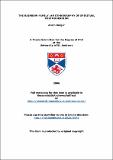The Rainbow Family : an ethnography of spiritual postmodernism
Abstract
The Rainbow Family of Living Light is an intentional society devoted to
achieving world peace through spiritual healing. A loose association of spiritual
seekers that explicitly rejects all forms of leadership and imposed authority, it
represents an interesting example of an anarchist and communal society.
Rainbow Family events regularly draw thousands of people. These take place all
over the world. While some participants may question the label, it can be
described as one of the biggest and most geographically diverse New Age
groups on the planet. As such, it is a very important factor in shaping the entire
present day New Age movement.
I conducted fieldwork with the Rainbow Family between the autumns of
1998 and 2002, traveling with the nomadic group throughout the United States.
The Rainbow Family rejects any sort of official membership, accepting anyone
who attends its events as an equal participant. Spending extended periods of
time in the field, I became immersed in this alternative society. The distinction
between ethnographic researcher and informants was highly problematic under
such circumstances. This made me acutely aware of the issues surrounding
fieldwork and anthropological authority. My own work began to seem quite
similar to the spiritual seeking of other participants. As such, I began to consider
the commonalities between anthropology and the spirituality encountered
within the Rainbow Family.
The spiritual discourses produced by Rainbow Family participants are
uniquely eclectic and ludic in tone. In a setting explicitly championing individual
freedom rather than coercion, there is no sense of spiritual orthodoxy. The ways
in which spiritual discourses are treated by the Rainbow Family display
interesting attitudes towards truth, authority, and reality. These attitudes are
reminiscent of epistemological orientations within postmodernist anthropology.
Rainbow Family participants find noteworthy solutions to the apparent
ontological dilemmas postmodernism presents. It is my hope that looking at the
Rainbow Family of Living Light will suggest a viable way for anthropology to
productively deal with its current crisis of identity.
Type
Thesis, PhD Doctor of Philosophy
Collections
Items in the St Andrews Research Repository are protected by copyright, with all rights reserved, unless otherwise indicated.

